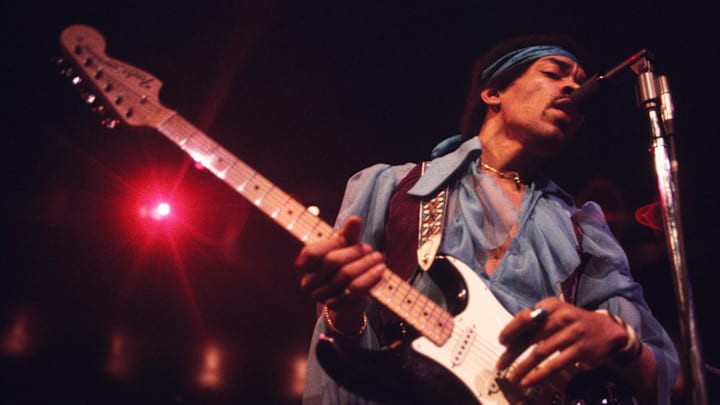Great guitar players (scientific name: Guitaris lupus rockyoursocksoffis) often possess a combination of technical proficiency, musicality, creativity, and passion for their craft. So here we will go over some key traits that contribute to greatness in guitar playing. To begin with, there is some technical skill needed, of course. Mastery of various basic techniques such as picking, strumming, fingerpicking, bending, sliding, and hammer-ons/pull-offs is essential.
A common statement about guitar is that it's easy to learn, but difficult to master. Great guitarists have excellent control over their instruments and can execute complex passages flawlessly (or at least make most of their mistakes sound intentional, which is absolutely a trick of the trade — and not only in rock!). "Emotional" depth is great, but if a guitarist wants to express a wide range of emotions, they should want a wide range of techniques to take us there.
After the simple techniques are pretty much mastered, then they can venture off into what are called "extended techniques." A lot can go into musicality, and probably should. Beyond just playing notes, great guitarists understand musical concepts such as dynamics, timing, phrasing, and tone.
They know how to convey emotion and tell a story through their playing. You know you have a great guitarist when it isn't just a sound but an experience. Creativity can still be the difference between a mere musician and a "guitar god" (though, admittedly, either people ignore guitar gods altogether or it may seem like they're a dime a dozen).
Innovation and originality set great guitarists apart
It's hard to be truly original. For example, some people say "Wow! Dave Davies from the Kinks cut up the speaker cone on his amp for rock distortion in "You Really Got Me!" There is some truth to that, as Davies did that. However, distorted guitars technically existed before he made it to the scene — for example, Junior Barnard, guitarist for Bob Wills and his Texas Playboys, did his best to make his guitar sound distorted back in the 1940s, if not the '30s.
Still, Davies was original enough, and a great guitarist in his own way — not afraid to experiment with different sounds, genres, and playing styles to create something unique. Typically, the greats are not overly concerned about ruining their reputations by occasionally veering outside their lanes. In fact, that's what can make them more interesting.
Ear training and stage presence
A keen ear for music allows guitarists to learn songs quickly by ear, improvise effectively, and communicate musically with other musicians. Basically, if you don't have some innate musicality and accrued experience with others, all the practice in the world will only make you a star in your own bedroom. On that note, what about stage presence?
Whether performing live or in the studio, great guitarists usually have a stage presence that captivates their audience, maybe a little bit like The Who's Pete Townshend. That being said, there are exceptions to every rule. For example, Robert Fripp famously doesn't tend to "put on a performance" during his live performances, and he is a famous enough guitarist. Still, some charisma, confidence, and a genuine connection with the music and the crowd are a good idea.
But wait...Here is Robert Fripp and his wife having fun with Nirvana's biggest hit:
Though it's good to have charisma. don't fall for the belief that confident people are un-selfconscious. Plenty of successful musicians struggle with nervousness even more after becoming famous. The trick is to still be able to get out there and transform that nervous, frenetic energy into something great for your audience.
Versatility, persistence, and practice
Being able to play various styles of music, from blues and rock to jazz, metal, and beyond, showcases a guitarist's versatility and adaptability. Those things also occur through persistence and practice. Great guitarists understand that mastery takes time and dedication.
They're willing to put in the hours of practice to continually improve their skills and expand their musical horizons. They often (though not always) exhibit a collaborative spirit. While solo performance showcases individual skill, collaboration with other musicians is also important. Many musicians gain new exposure by being a featured artist of so-and-so. Great guitarists know how to listen, communicate, and work together with other band members to create cohesive music.
Influence and impact
Truly great guitarists leave a lasting legacy on the instrument and inspire future generations of players. They may also be polarizing, at times. For example, Hendrix’s iconic rendition of “The Star-Spangled Banner” is iconic not because it was a "perfect" piece of music, but because it was an artistic statement that resonated with listeners, and viewers. It was shocking.
It blew people's minds, and it stood on its own two feet seemingly regardless of how others felt about it. It's almost more beautiful because of its flaws, as it seemed to convey a nation in turmoil, yet still resilient. So yes, some of the greatest guitarists influence the direction of music and shape the evolution of guitar playing, even if not everyone "gets it" about what they are doing.
Passion
Above all, great guitarists have a deep love and passion for the instrument and the music it creates. They love when they come up with something good, perhaps almost too obsessively sometimes. That's right, girlfriends: Sometimes a guitar might take priority over your needs, because that's just how it is with the lonely great guitarist!
On the plus side, if you are literally creating baby-making music, that's something impressive in its own right.
At the end of the day, a masterful guitarist's dedication to music drives them to constantly strive for excellence and push the boundaries of what's possible on the guitar. Oh, and yes: Every great guitarist has to be able to make the "stank face" — if you can't do that, you're not a great guitarist. Period.
